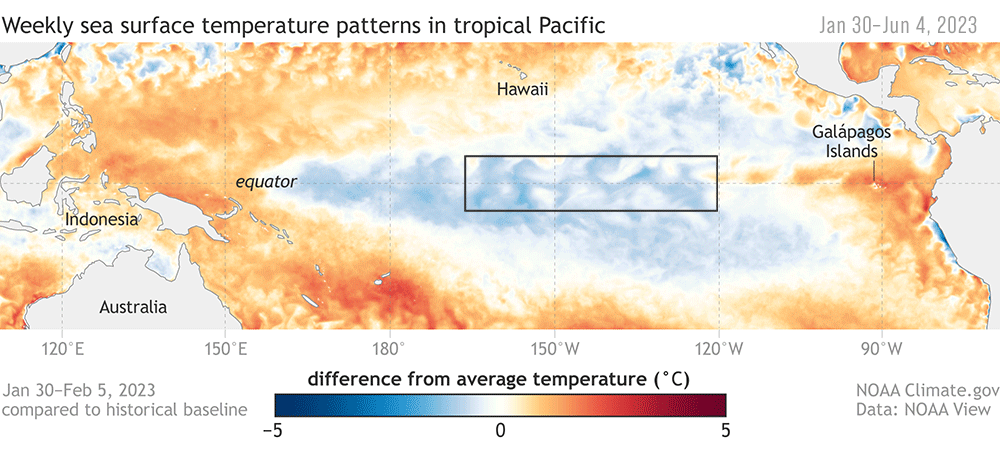NOAA
The World's Fourth Mass Coral Bleaching Event Is Underway—and It Could Become the Worst One Yet
The impacted reefs represent 54 percent of the planet's total, and that figure is currently increasing by 1 percent each week, NOAA scientists say
This September Was the Earth’s Hottest on Record
The scorching month follows the hottest June, July and August in recorded human history
What Is This Mysterious Golden Orb Scientists Found on the Ocean Floor?
After bringing the four-inch-diameter blob to the surface, researchers still only know that it is “biological in origin”
Hurricane Idalia Hits Florida Amid Projected 'Above-Normal' Storm Season
The hurricane is the strongest to strike the state’s Big Bend area in about 125 years
Earth Faces Hottest Day Ever Recorded—Three Days in a Row
Researchers attribute the sweltering heat to a combination of human-caused climate change and El Niño, which has a global warming effect
El Niño Has Arrived
The natural climate pattern usually increases global temperatures and could lead to record-breaking heat
See the Breathtaking Ocean Life Found at Deep-Sea Vents
An international team of scientists discovered new hydrothermal vents along the Mid-Atlantic Ridge releasing mineral-rich water hot enough to melt lead
Widespread Auroras That Lit Skies This Week Are Getting More Common
The stunning colors that dazzled viewers on Sunday will appear again as the sun's activity builds to a peak in 2025
These Sea Stars Are Literally Wasting Away—but They May Soon Receive Protection
Sunflower sea stars have been recommended for Endangered Species Act protection as disease leads them to “disintegrate into gooey masses”
Carbon Dioxide Levels Now Higher Than Ever in Human History
Levels have risen more than 50 percent in the last two centuries alone
NOAA Predicts Another Busy Hurricane Season This Year
2022 will likely be the seventh consecutive year of above-average hurricane activity
The West Coast Should Brace for Spring Megadrought, NOAA Warns
More than half of the United States is likely to struggle with limited water supply and increased risk of wildfires in the coming months
Sea Levels Will Rise One Foot Along U.S. Coasts by 2050
Some regions could see as much as seven feet of sea level rise by the end of the century if greenhouse gas emissions aren't curbed
Intense Lightning 'Megaflashes' Stretched Almost 500 Miles Across Three U.S. States
The bolts, which occurred in 2020, broke records for distance and duration
Beavers Are Reshaping the Arctic Tundra. Here's Why Scientists Are Concerned
Ponds made by the large rodents are causing permafrost to thaw, releasing methane and carbon dioxide once stored in the frozen Earth
See SpongeBob SquarePants' and Patrick Star's Real-Life Twins
The aquatic pals were discovered one mile deep in the Atlantic Ocean during a NOAA expedition
'Heat Dome' Descends on Central United States
Forecasts suggest more than 30 million people could see temperatures topping 100 degrees this week
NOAA's Weather Forecasting System Just Got a Major Update
The new version of the Global Forecast System could give Americans in the path of a hurricane an additional 36 hours to prepare compared to the old model
Large New Whale Species Identified in the Gulf of Mexico
Named Rice’s whale, the species can reach lengths of 42 feet and lives in the Gulf’s warm waters all year
U.S. Breaks Record for Billion-Dollar Climate Disasters in 2020
A total of 22 disasters caused $95 billion in total damage, reflecting climate change’s growing cost
Page 1 of 2
:focal(1063x708:1064x709)/https://tf-cmsv2-smithsonianmag-media.s3.amazonaws.com/filer_public/7f/77/7f7737cf-9909-41bd-8ac1-4196d0223e0b/gettyimages-1214651199.jpg)
:focal(512x341:513x342)/https://tf-cmsv2-smithsonianmag-media.s3.amazonaws.com/filer_public/99/8e/998e6ad5-8b17-48d5-ae5c-8583149b53e6/gettyimages-1697761476.jpg)
:focal(960x544:961x545)/https://tf-cmsv2-smithsonianmag-media.s3.amazonaws.com/filer_public/4a/b0/4ab0253c-7a1e-4492-83e7-e2c7e4ddc638/orb-hires.jpg)
:focal(400x267:401x268)/https://tf-cmsv2-smithsonianmag-media.s3.amazonaws.com/filer_public/2c/07/2c079e15-7fa4-49d9-a3f8-1019ed397d1b/gettyimages-1634057836.jpeg)
:focal(1500x943:1501x944)/https://tf-cmsv2-smithsonianmag-media.s3.amazonaws.com/filer_public/1d/11/1d11731f-5d2b-457d-b213-4643812b28cb/gettyimages-1502856406.jpg)

:focal(400x229:401x230)/https://tf-cmsv2-smithsonianmag-media.s3.amazonaws.com/filer_public/cd/82/cd82359b-83e8-45eb-a30e-e71469e64666/resized_vent_image.png)
:focal(1024x770:1025x771)/https://tf-cmsv2-smithsonianmag-media.s3.amazonaws.com/filer_public/05/63/0563102b-390b-4162-a2ba-c41090567580/fuc_tx_amaezwic.jpeg)
:focal(256x193:257x194)/https://tf-cmsv2-smithsonianmag-media.s3.amazonaws.com/filer_public/94/2d/942d6471-f3be-4ede-8c72-c108ce57be73/sun_flower_sea_star_in_tide_pools.jpg)
:focal(1061x707:1062x708)/https://tf-cmsv2-smithsonianmag-media.s3.amazonaws.com/filer_public/ef/b2/efb25446-8ce1-4795-b5ab-16a11f22b47e/gettyimages-1324588190.jpg)
:focal(1668x1041:1669x1042)/https://tf-cmsv2-smithsonianmag-media.s3.amazonaws.com/filer_public/0b/55/0b55c2dd-5f6f-48ea-9358-37a47e86423b/noaa-20_nora_and_ida_august_28_2021.png)
:focal(2867x2458:2868x2459)/https://tf-cmsv2-smithsonianmag-media.s3.amazonaws.com/filer_public/90/78/90785b2b-f706-4e5b-95c3-5ef5173839dc/gettyimages-522683736.jpg)
:focal(2000x1333:2001x1334)/https://tf-cmsv2-smithsonianmag-media.s3.amazonaws.com/filer_public/15/9e/159e0ee5-738c-4023-9151-9d1d3e6aa978/gettyimages-1228554514.jpg)
:focal(960x539:961x540)/https://tf-cmsv2-smithsonianmag-media.s3.amazonaws.com/filer_public/fb/8f/fb8fb6a9-af3e-46f3-bfe1-db3bc858774e/photo-lightning_as_seen_from_the_geostationary_lightning_mapper_on_noaas_goes-16_satellite_-_042920_-_noaa.png)
:focal(600x400:601x401)/https://tf-cmsv2-smithsonianmag-media.s3.amazonaws.com/filer_public/d6/57/d657ff3b-8421-489e-83a1-3fa673d71482/43883744_caf5f97ddb_o.jpg)
:focal(771x537:772x538)/https://tf-cmsv2-smithsonianmag-media.s3.amazonaws.com/filer/01/09/0109cef2-ea67-4146-a4a1-c21e34be7eb0/e7uzqvovcamq3mk.jpg)
:focal(346x194:347x195)/https://tf-cmsv2-smithsonianmag-media.s3.amazonaws.com/filer/09/df/09dfd6ed-cfef-49c9-bd9d-857d530463bb/226330127_4330595633673986_8927475858396465519_n.png)
/https://tf-cmsv2-smithsonianmag-media.s3.amazonaws.com/filer/6f/1c/6f1c14c2-e725-4d35-b227-c6b8486561f4/20200825-cafireslaura_2.gif)
:focal(403x257:404x258)/https://tf-cmsv2-smithsonianmag-media.s3.amazonaws.com/filer/83/9a/839a820a-3cdd-4bb7-87f9-c6aa6801ef2e/brydes_whale_in_everglades.jpg)
:focal(318x153:319x154)/https://tf-cmsv2-smithsonianmag-media.s3.amazonaws.com/filer/22/cb/22cb2eb0-268e-4a90-9c14-1e45ade51d47/laura_27aug2020_620.gif)